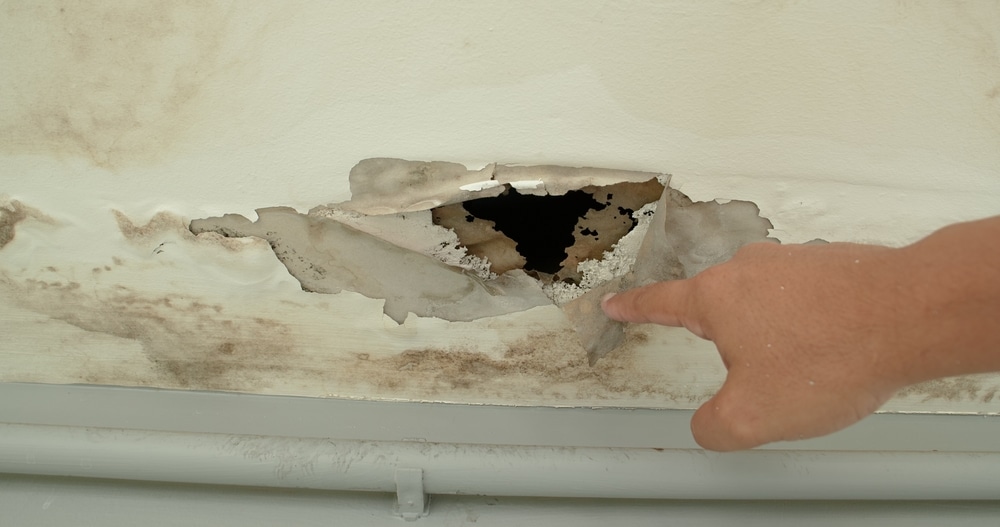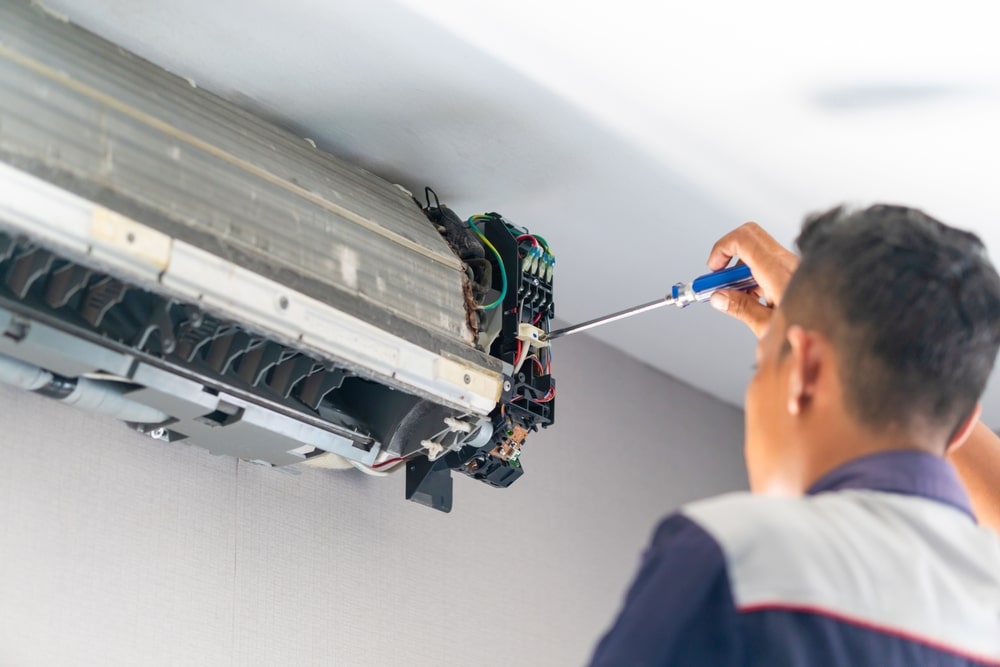Contents
Your home’s heating, ventilation, and air conditioning (HVAC) system is responsible for keeping you comfortable year-round. But when issues arise with your HVAC due to neglected maintenance, risks of leaks and water damage become far more likely.
weDRY Restoration is here to educate you on ways to prevent HVAC water damage. The ins and outs of an HVAC system can often be difficult to deal with unless you’re a seasoned pro—but that’s why we’re here. We aim to provide you with the causes of flooded or leaky HVAC systems and how to prevent them from becoming a reality.
Why Do HVAC Systems Flood or Leak?
It’s a common question among homeowners. Why do HVAC systems leak water? HVAC systems usually flood or leak because of dirt, dust, or debris clogging the drain line. When this happens, water isn’t able to leave the home fast enough, leading to heightened water accumulation that ends up flooding the drain pan.
When it comes to a leak in your home’s air conditioning, it’s usually a result of a hole or cracks in the drain pan. Considering drain pans are made of metal, corrosion is common. Once the drain pan becomes brittle, parts of it begin to fall off, and water soon begins to leak.

How to Prevent HVAC Water Damage?
Now, what are the best ways to prevent HVAC water damage? Start by putting these steps into practice to better help prevent HVAC water damage:
-
Change the HVAC Filter
Start by changing your filter at least once a month with high-efficiency particulate air (HEPA) filters. This helps prevent your unit from overworking itself, which can lead to freezing and then defrosting on the evaporator coils, potentially leading to HVAC water damage. Filters should be changed more frequently in times of higher usage.
Check the instructions manual to determine what type of filter your system needs. If the filters are inside the furnace or air handler, turn to a professional to make sure the job is done right.
-
Maintain the Condensation Drain Line
Maintaining your HVAC’s condensate drain line is an important measure to help prevent HVAC water damage. First, check the opening of the condensation line when your AC is running to make sure you see water flowing properly to the drain. The amount of flowing water is dependent on the humidity level in the house. Then, flush the drain with an algae inhibitor once or twice a year to prevent the growth of mold or algae. Safe commercial cleaning solutions or bleach are best.
Is the drain line already clogged? Remove its paper filter and attach a wet/dry vacuum to the drain line to suck the clog out. Then, make sure the main drain line and emergency drain line are properly installed and connected. If you find that the piping isn’t oriented correctly, it might be knocked out of its intended alignment.
-
Install a Condensation Pump
Another way to avoid HVAC water damage is the installation of a condensation pump. Condensation pumps help excess water flow into their intended disposal drain. Also, to mitigate the issues relating to condensation build-up and overflowing water, simply install a safety float switch. These switches automatically shut down the power to the AC.
-
Maintain the Overflow Drain Pan
Like the condensate drain line, drain pans also need to be properly maintained to help prevent HVAC water damage. The drain pan collects water that has overflowed due to a clogged drain line. Drain pans that are made of metal or plastic could get damaged over time, resulting in potential leaks.
Notice leaks near your system’s drain pan? Using a flashlight, carefully inspect the drain pan for any signs of damage. Consider patching up small holes or cracks in the drain pan using epoxy glue and, if need be, replacing it. You should regularly clean the drain pan by rinsing and cleaning it with a mixture of bleach and water. This mixture clears out any dirt or mold growth.
-
Schedule a Yearly Maintenance Appointment
Like many other components in your home, regular maintenance is one of the best preventive measures there is. Having an expert check your HVAC unit once a year brings about a smooth and properly functioning system. Yearly appointments also check for upcoming repairs, and clean and lubricate the various mechanical and electrical components.
Regular maintenance appointments will save you money in the long run by diagnosing issues early on, avoiding the possibility of costly repairs.

What Should I Do if HVAC Water Damage Becomes a Reality in My Home in Michigan?
If your Michigan home begins to show signs of HVAC water damage, contact weDRY Restoration. weDRY Restoration has the water damage restoration services your home needs if HVAC water damage becomes a reality. No amount of water damage is too large for our experts to help with.
We make it our priority to go the extra mile and provide support long after our crew has left the scene. We are focused on providing an unmatched level of water and mold removal and restoration services that you cannot find anywhere else in Michigan.
Other Services We Offer
The team at weDRY Restoration does more than water damage restoration. We are also leading providers that can help with fire damage, mold removal, storm damage restoration, and other commercial services throughout Southeast Michigan. Whether you’re dealing with a flooded basement or a sudden disaster at your commercial property, weDRY Restoration is the answer.
We pride ourselves in making sure you are comfortable by communicating all necessary findings throughout the restoration process. Your damage will be thoroughly examined and properly treated for the safety and well-being of your loved ones and customers. From the start, we will document and photograph all damage and submit all necessary paperwork to your insurance company. We know that dealing with the insurance company can be stressful. Our expert staff will make sure all documents are processed properly so you get the full compensation you deserve.



